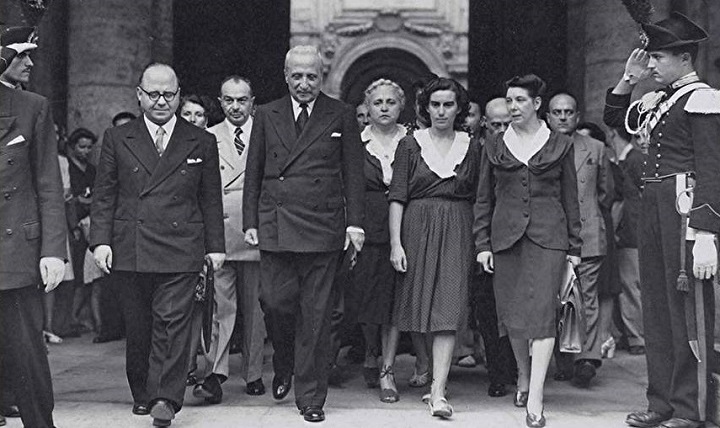On Tomorrow of 4 July Marco Damilano presented a reconstruction of some passages in the history of the political commitment of Italian Catholics which, in his opinion, should be resumed at this critical moment as a contribution of today’s Catholicism to the country. After one of our editorialFranco Monaco intervenes.
Damilano is a brilliant commentator. He was a pupil of Pietro Scoppola and an expert on the story of the political movement of Catholics, who then moved on to journalism. Of his thoughtful article, some theses convince me, others less so.
Among the first:
1) The appreciation for the virtues and merits of that mix of spirituality, culture and politics that goes by the name of “democratic Catholicism” and which, in the first period of the Republic, crossed and transcended the borders of DC (often serving a condition minority in it): care for the distinction between Church and politics, the culture of mediation between ethical principles and political practice, the meaning / value of institutions as a common home, the attitude to cultural and political dialogue.
The opposite of the paradigm of “civil religion” and even more so of the explosive mixture of Christianity and nationalism of the American right, of the ruling parties in Hungary and Poland, as well as of some imitators of the Italian right who love to exhibit rosaries and holy cards.
2) The memory of the discomfort it suffered in the not short period of the Italian Church which experienced a regression with respect to the conciliar updating. A time politically marked by the paradigm of “non-negotiable principles”, dear to Cardinal Ruini, with the consequent mortification of lay autonomy, the negotiation no longer mediated between ecclesiastical and political leaders, the endorsement of the leadership of the presidential movements they loved ” counting to count ”, movements congenial to that vision of the relationship between the Church, society and politics.
3) The bet on the opportunities opened up by the presidency of the CEI entrusted to Cardinal Zuppi, of which an open support, no longer shy, would be a first signal for the ius scholae and a measured and cautious reaction to the US Supreme Court ruling on abortion. So as to avoid lacerating political-religious wars on the lay-Catholics axis.
However, I have some hesitation in going so far as to subscribe to Damilano’s central thesis, namely that of a promising new season of Catholics as actors-protagonists in the field of the extension of rights. Apologetic thesis, in my opinion, a little exaggerated.
Only three findings:
1) It deserves to be understood on the concept of “democratic Catholicism”: it is not the whole but only a part of political Catholicism that knows many other variants. It is, in particular, that part that is not resolved (should not be resolved) in mediation, nor in the simple attitude of being with dignity within the institutions, but which is (should be) also characterized by the tension towards change and even by a well-understood radicality.
By preserving and witnessing a visible (even in politics) “Christian difference”. Especially in the direction of more justice and the fight against inequalities. Ruini was not wrong to represent (from his point of view, critically) the so-called democratic Catholicism as oriented to the left. From this point of view, it does not seem to me that it is adequately represented in politics today. The balance of his current political fruitfulness seems to me less brilliant than Damilano considers it, who perhaps is veiled by the friendship that binds him to various exponents of that tradition mentioned by him in his writing. On the other hand, they are very different from each other.
We cannot be satisfied with men and organic parties to the establishment. Nor can we resign ourselves to the emphasis on (individual) civil rights at the expense of social and labor rights and a vision of the world order that is not dogmatically Western. Here I find more shortcomings than excellences.
2) It is reasonable to bet on the novelty represented by the Zuppi presidency, but perhaps it is premature to interpret it as a sure turning point for the collective of the Italian episcopate, which so far has shown that it is struggling to keep pace with Pope Francis. As the pontiff himself has implied on several occasions, with words that are not always diplomatic. And in any case, the reflections on politics would, if anything, intervene downstream of pastoral orientations on which innovations were more properly produced. We give time to time. But I understand: the reporter looks for the news and maybe packs it in advance.
3) It does not seem to me that in the crucial reflection on war democratic Catholicism has shown a mature discernment, nor a substantial unity. Quite the contrary. It was divided between uncritically “American” positions and positions inspired by naive pacifism.
The former are largely dominant among those with political-institutional responsibilities; the latter within society and Christian-inspired associations. The former essentially deaf to the warnings of Francis (often dismissed with the well-known exorcistic formula according to which he would do … his job as pope, but politics is something else); the latter are inclined to content themselves with mimicking him.
Without precisely that political mediation that Damilano gives them a little too generously. Or, perhaps, by showing that he appreciates the first from a slightly too Roman perspective.


